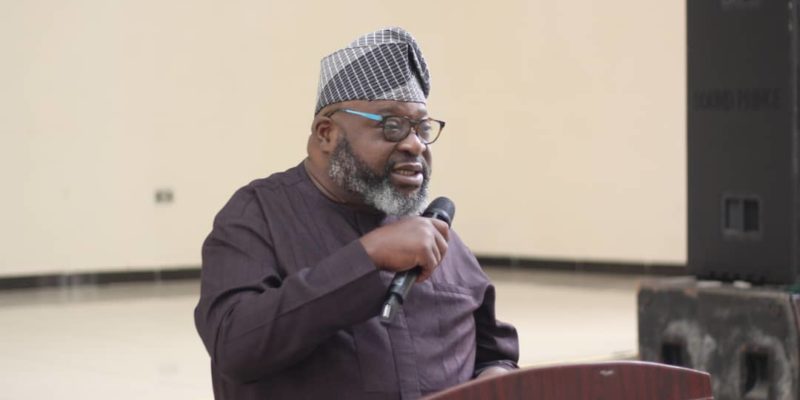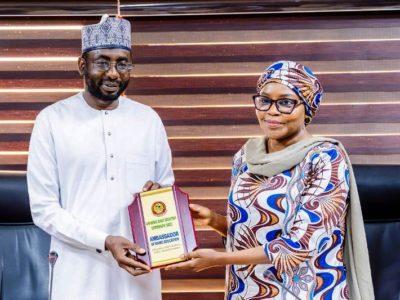Director General of National Information Technology Development Agency (NITDA), Kashifu Inuwa Abdullahi has emphasised the need for an inclusive approach to collaborating with stakeholders to create awareness on how states could take advantage of the agency’s Strategic Roadmap and Action Plan (SRAP 2021-2024) to drive digitization.
RELATED: NITDA reiterates commitment to creating opportunities for girls, women in Nigeria
Abdullahi, who was speaking a recent one-day stakeholders’ workshop programme in Uyo, the Akwa Ibom, said as Nigeria navigates digitalisation and entrepreneurial evolution, NITDA stands as a beacon of guidance and is committed to “providing an enabling environment, a framework of support, and a platform for collaboration that empowers all stakeholders to be catalysts of change.”
The event was organised by NITDA in collaboration with the Akwa Ibom state’s Ministry of Science and Technology.
“Digitalisation is when digital technology becomes a part of every aspect of society. It is not just a fancy word but it is what causes big changes in industries because it changes the way we do business, take care of our health, educate ourselves, and even govern,” said Abdullahi who was represented by the agency’s Director, Zonal Offices Directorate, Ajayi Babajide Ayodimeji.
Adding: In fact, Didigitalisation changes things for the better, eliminates obstacles, and creates new chances that we couldn’t even think of before; our responsibility is therefore to take hold of these possibilities and use them to transform society.”
The NITDA boss, who described the theme of the event: ‘Creating Opportunities, Breaking Boundaries: Towards Digitalisation and Entrepreneurial Evolution’ as apt for the engagement, noted that the gathering was not only to discuss concepts, but to chart a course that will redefine industries, empower individuals, and shape the future of the nation.
His words: “Modern digital technologies have changed how uncertainty in business processes and results work and how we can effectively handle these uncertainties.
“This brings up important questions about where digital technologies and entrepreneurship intersect, especially in digital business. We think about two main results: more flexible business processes and results, and less fixed places where business decisions are made.”
According to Abdullahi, NITDA established the Office for Nigerian Digital Innovation (ONDI) and the National Centre for Artificial Intelligence and Robotics (NCAIR) to encourage innovation and entrepreneurship, stressing that these special purpose vehicles (SPVs) have supported startups, including technology incubation, acceleration programmes, and training for students.
He said the innovation ecosystem in Nigeria has attracted significant investments and produced multiple successful startups, including unicorns.
“Today, as we focus on entrepreneurial evolution, we underscore the need to nurture a culture that not only welcomes innovation but also celebrates resilience in the face of adversity.
Our digital landscape is bursting with ideas waiting to be transformed into impactful solutions; as we engage in conversations and partnerships today, let us remember that each connection forged, each idea shared, and each resource pooled is a step towards unlocking these opportunities”, he stressed.
He added that NITDA is currently drafting the National Digital Equality Strategy for Women (NDESW), which seeks to ensure equitable access and opportunities in the digital environment, empowering women to fully participate in the digital economy, adding that the National Digital Skills Strategy (NDSS) is a strategic roadmap that will aid digital literacy and talent development in Nigeria.
“The true measure of our success lies not just in the strides made by some, but in the progress achieved by all; so, bridging the digital divide, enhancing digital literacy, and ensuring equitable access to technology are vital components of our journey, because only then can we proudly declare that we are on the path of complete transformation”, Inuwa maintained.
The Honourable Commissioner for Science and Technology, Akwa Ibom State, Imoh Moffat represented by the Director of Information and Communication Technology (ICT), Lawson David enumerated five critical focus areas for the ministry which included embracing the digital revolution, nurturing a culture of innovation, empowering the digital workforce, bridging the digital divide and cyber security.
“As stakeholders of NITDA, we have a unique opportunity to drive innovation, foster a culture of creativity and bridge the digital divide and by empowering our workforce, protecting our digital future and embracing the digital revolution, we can position Nigeria as a global leader in the digital era”, Moffat assured.
The programme was attended by 81 participants drawn from the state. The participants ranged from various stakeholder groups including ICT experts, government representatives, academia, start-ups, ICT associations, technology solution providers, non-governmental organisations (NGOs), and individual stakeholders in the digital economy sector.





























